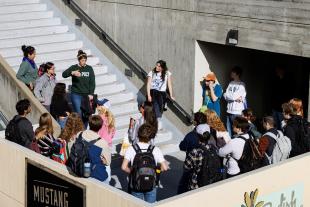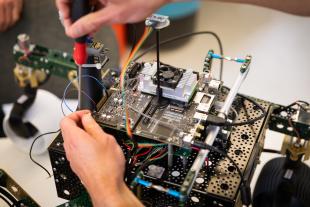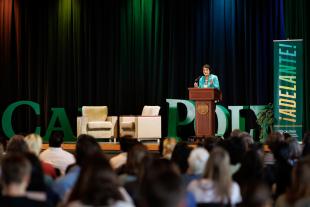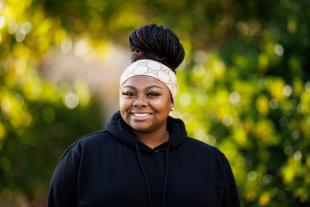MLK Award Winner Aims to Create 'Wraparound Love' For Her Students
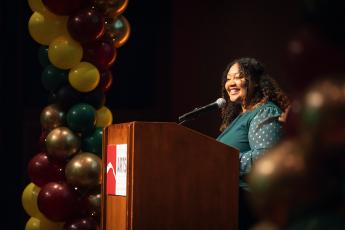
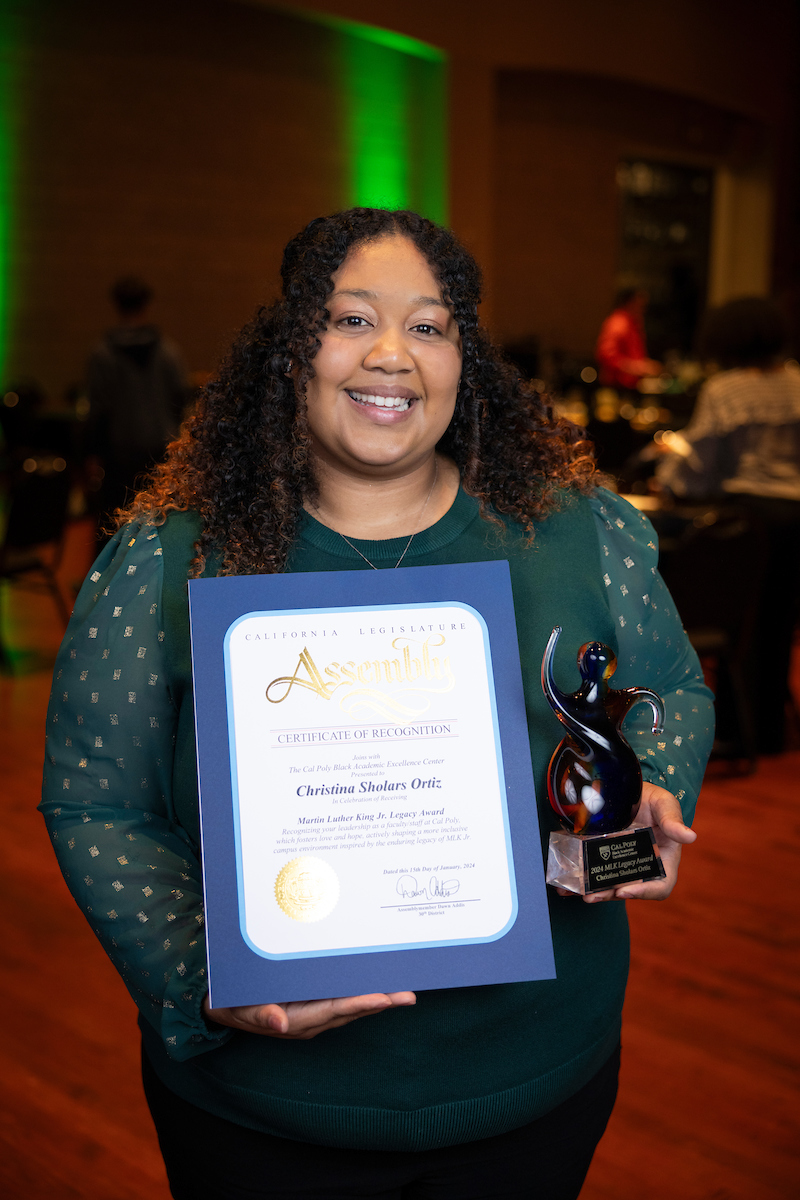
At the 8th annual MLK Jr. Legacy Event in January, no one was more surprised to hear the name of one of the winners than the winner herself. Christina Sholars Ortiz, coordinator for the Black Academic Excellence Center (BAEC), co-accepted the award along with student Genesis Glover. Sholars Ortiz is also the interim coordinator for the Latinx Center for Academic Success and Achievement (La CASA), co-advisor to the Black Student Union (BSU), vice president of the Cal Poly Black Alumni Community and is on the advisory board for Students with Dependents.
Cal Poly News sat down with Sholars Ortiz to learn more about her work and her vision of a supportive and loving environment on campus. The conversation below has been edited and condensed for clarity.
What did it feel like to win this award?
I had mixed feelings because I was hosting the event, but it was really beautiful. I don’t always get to sit back and take it all in.
I was talking with students after I won the award, and one started tearing up as he told me how much he appreciated me supporting him when he felt like he messed up. This was the moment it hit me about the impact I have made on campus. It reminded me why the work I’m doing is so worth it. It made me feel like this was not only special for me but for the people I contribute this work to.
I've only been in this role for about 14 months, and I’ve poured a lot of my heart into it because I’m doing this, not just for the students that you see here every day, but in preparation for those future generations that are going to come to this campus.
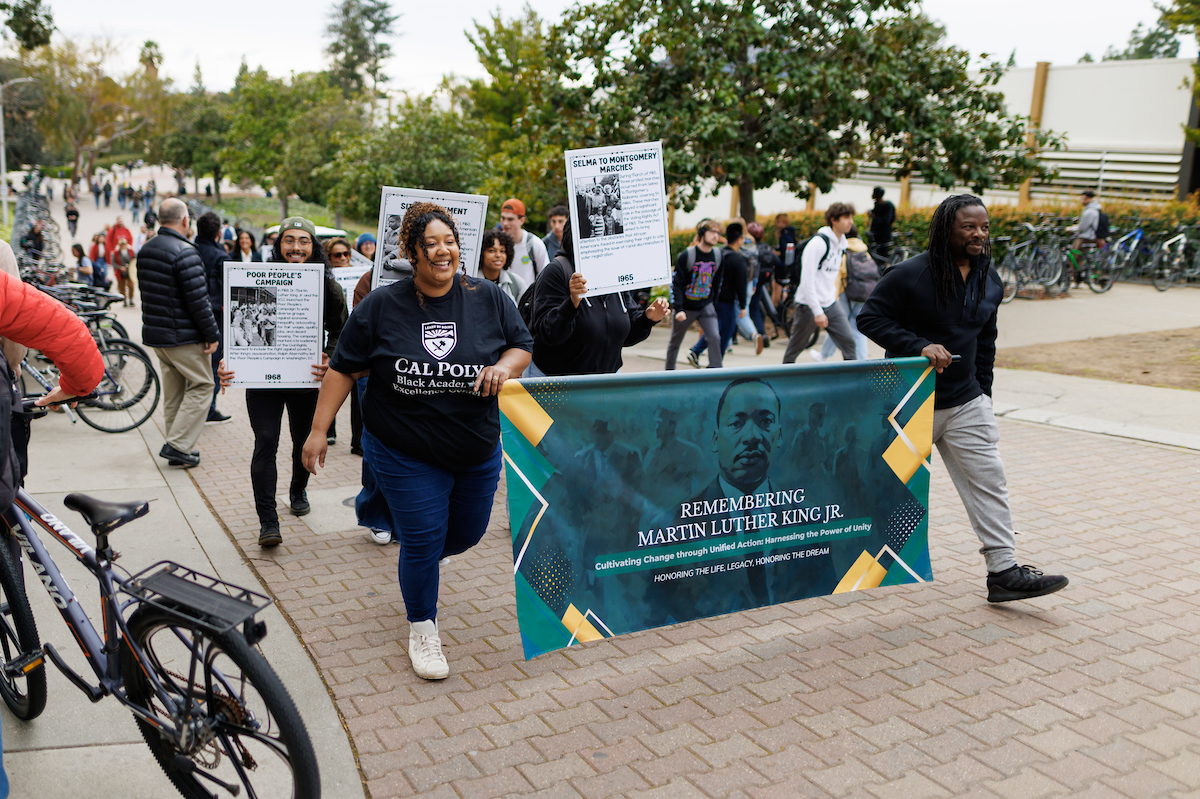
Can you talk about your work as a coordinator for BAEC and LA CASA?
What I've noticed in working with students at both BAEC and La CASA is they just want someone who is consistently there to support them. If you can be genuine in that process, open to learn, you will be accepted and supported. I think all people want is to feel respected, seen, heard and valued. That’s what I bring to those centers. We’re not going to be perfect in that process, but we can at least try.
The work that I'm doing is to understand the needs of the students in each center and see how I can elevate their voice through my various roles of being an alum of the campus and a colleague to campus partners and get them into our centers.
When students say, ‘Hey, I don't feel like I'm seen,’ then I take that to heart because I know what it's like to not be seen, especially because I am mixed, and spent a long time feeling like I wasn’t Mexican enough, or Latina enough. Being able to recognize what students are experiencing and align that with my personal experiences has also helped me shape the change that we're all looking for on campus.
What drives you?
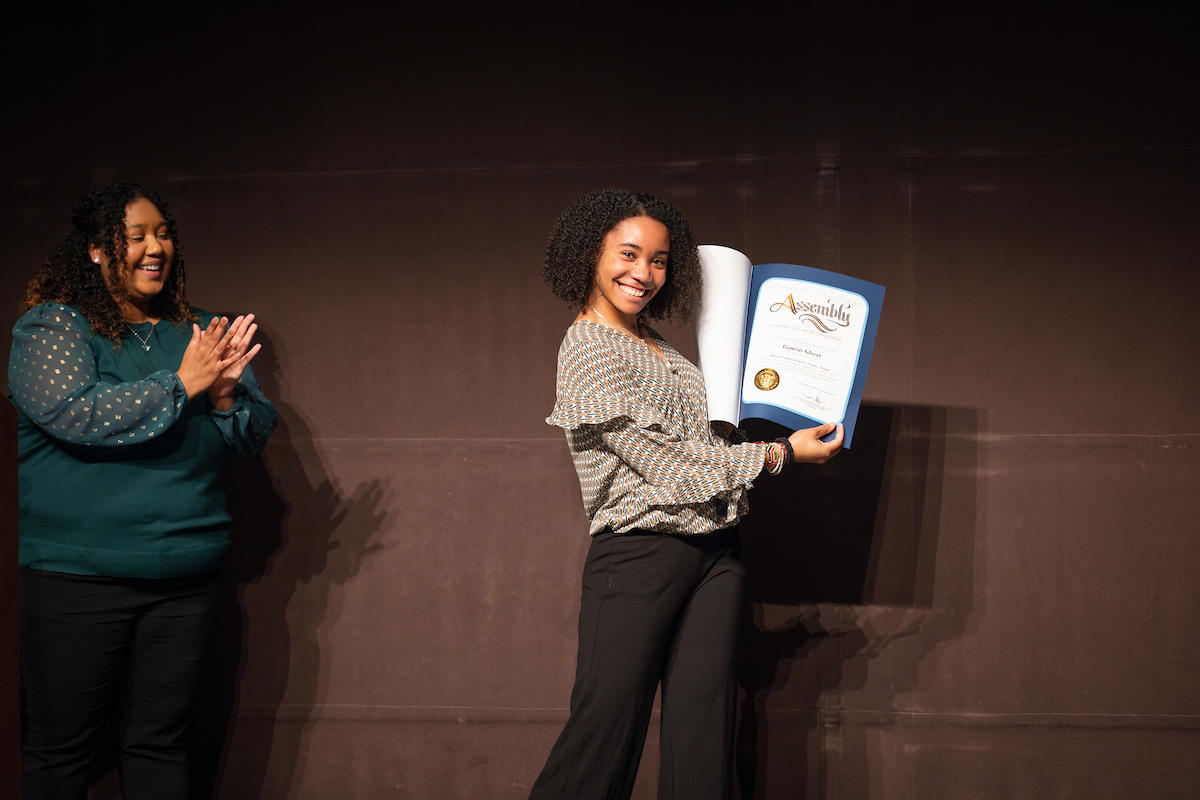
What I'm creating is what I wish I would have had growing up: a community on campus designed for students to walk into a space for them, by them, and be able to exhale, be reminded of how amazing they are, laugh in community, and feel an essence of home.
I’m pulling in campus partners, community leaders to create the wraparound love and support that I wish I would’ve had — that I know I want my kids to have by the time they get to college, so that I know that the institution is safe and that they are going to find someone that is supportive of their goals and cares about them just as much as I do.
I think it takes us all a little bit of time to know that there are people at Cal Poly that care, want to provide an experience for you and also want you to know that we can have a home away from home — even if it's for a four- to five-year time.
I completely understand the worry and concern that comes with a family saying, ‘Yes, we’re going to stand behind you when you go to this institution. I just want families to know that when your student comes to this campus, we will be there to support them. We will be the ones to remind them of just how important and loved they are, just like their family would. That's what I try to create.
Are there any events you’ve put on for BAEC or La CASA that you’re particularly proud of?
A newly designed signature event I am proud of is shifting our State Of events. State Ofs traditionally have been a two-hour panel focusing on the lived experiences of four to five students, staff and faculty. This can be emotionally taxing on individuals.
I was able to use my vision to transform the events into becoming an event with voices from the campus and local community. For the State of Latinx this past October, we had, in total, about 10 different campus partners who attended and shared about their work, including representatives from Campus Health and Wellbeing, the Office of University Diversity and Inclusion, which is working on the HSI initiative, and the Men and Masculinity Center, which shared about their Men of Color Success Initiative. For February’s State Of Blackness, I curated a panel of 4 students, but expanded roundtable discussions to include campus and community leaders to highlight areas they are supporting our Black student community including Housing, student organization NSBE and Development for Strategic Initiatives while we added an interactive activity: a drum circle led by Tracy Morgan of R.A.C.E Matters.
What we’re doing is transforming each State Of event to become a space where students, faculty, staff and community members have an opportunity to learn from different campus partners and community leaders on the work they do to support a particular community and how they can support as ally’s, colleagues or community members.
It really creates a more personal touch, where students can see how we’re actively working on creating change at Cal Poly — not just in our homes or within ourselves, but within the campus and community they live in.
We’re also asking, ‘How are we actively moving forward, how are we actively putting the work in?’
State Ofs are now transitioning to highlight the work we are doing as a collective on campus.
Since coming to Cal Poly, how have you seen campus culture evolve, and are you optimistic about its trajectory?
I transitioned to Cal Poly as a graduate student in 2020. I remember the frustrations and the sadness from Black students feeling unheard and unsupported at those times.
Throughout my journey at Cal Poly, I have observed significant progress and support for students within the Black community. I am grateful for the dedicated individuals among my colleagues and community leaders, including Dr. Jamie Patton, Dr. Camille O’Bryant, Melissa Furlong, Juliette Duke, Dr. Denise Isom, and Dawin Whiten who are committed to fostering an inclusive environment where our Black students feel valued and serve as pillars for positive change on campus.
Having support from leadership is key to transformational change. Dr. Jamie Patton, who leads Student Diversity and Belonging, has helped tremendously with our center becoming what it is. President Dr. Jeffery Armstrong has actively worked to stay connected to many of the students who use our center, contributing to the change I aim to make on campus.
Furthermore, the support from our campus department partners, including Career Services, Mustang Success Center, Campus Health and Wellbeing, Housing, Admissions, Athletics, Transfer Center and Office of Writing and Learning, is instrumental in helping me craft transformative experiences for our students.
We are making strides. The supportive framework is in place. However, it's crucial for students to actively engage and explore how this support manifests for them.
I'm observing a noticeable shift in campus culture, not only through collaborations with campus partners but also through the evolving roles our students are assuming as leaders. We have students participating on the board for ASI, conducting research within BEACoN, and actively engaging as tutors. Our students are seizing opportunities to carve out their paths while also enriching the experiences of many of us in the process.
Of course, there will be challenging days ahead, but I have seen growth. It just takes time.

